Unit 7 Introducing a Speaker
七年级上册英语U7+听说公开课

big
small
short
long
a small yellow hat
a long brown T-shirt
a big red hat
a short brown T-shirt
Do you like these long blue and yellow socks ?
While-listening
Unit 7 How much are these socks? Section A 1a-2d
cheap (便宜的) convenient(方便的) comfortable(舒服的)
bag [ bæ g ]
hat [hæ t ]
jacket [ æ]
sweater [ 'swetə]
skirt [skɜ :t] T-shirt [ ʃ ɜ :t ]
$5 $7 $2
A: I like _tthth_ttahehh_enee_ebdbg_blriyor_lgoeenae_wdlgpecl_oknnusb_whrl_Ttsuoprs_w-eoorls_ectuh_skashi_strea_etrrt_s. How much is it / are they?
rising tone
Woman: It’s six dollars.
falling tone *liasion 连读
Girl: And how much are these shorts?
*powerful words Woman: Oh, they’re eight dollars.
(有力量的词) Girl: And this sweater? How much is it?
Words like and ,oh, Let’s see make the conversation
How to Introduce a Speaker

How to Introduce a SpeakerIn formal gatherings or larger meetings it's often necessary — and helpful — to introduce the main speaker. With the right preparation, you can make the event more successful and establish your own professionalism.An introduction serves two purposes:1.It acts as a bridge, a transition from one part of a meeting to another. It gives the audience time to make amental and emotional shift.2.It prepares people for the speaker, heightening their sense of openness and anticipation.Your task is to introduce the speaker, not to take center stage. The spotlight is on you only for a moment so that you can shine it where it belongs: on the speaker.Keep it brief. For informal gatherings 30 seconds is plenty. For larger events, aim for no longer than a minute. Under certain conditions — a very formal event with a very important speaker — you may need to speak for up to two minutes.1. Research.Talk to the speaker in advance of the event.Find out what he or she is talking about and why ithas relevance to the audience. Then learn as much as you can about the speaker's experience,education, life, interests, and accomplishments — whatever helps establish the speaker'scredibility on the topic he or she is addressing.Many speakers will send you a resume or their own written introduction. Use it to help youprepare your remarks, but do not read it verbatim. (It is usually too long andself-aggrandizing.)Make sure you know how to pronounce the speaker's name.2. Prepare a 3-part outline.A good introduction tells people why this speaker is talking about this subject at this event.The first part of your introduction states a common problem or concern the audience shares.The second part briefly (in a sentence or two) states how today's speech will help them solvethat problem or address that concern.And the final part of your introduction establishes the speaker's credentials — convinces theaudience that the speaker knows what he or she is talking about.3. Perform.Walk to the podium with confidence. Arrange your notes and adjust the microphone. Take abreath. Look at the audience and smile.Speak your introduction. Conclude with the speaker's name, which is her or his cue to comeforward.Wait at the podium until the speaker arrives. Shake his or her hand and step back from thepodium, handing it over symbolically to the speaker.Three Introduction Templates1. "Good evening. My name is...and I will be introducing tonight's presentation. Our guest speaker has been called a... by Time magazine and not supportive of our system of checks and balances, that she is overly concerned with revolutionary tactics rather than working within our current political system. Are those strange qualifications for a speaker about to address this Conference of..., striving to work within the system?Ms....'s career has taken her through 25 years of study, research, teaching and administration. She holds 3 advanced degrees in...and... She has written numerous articles for scientific and popular journals. As Secretary of the...under the...administration, she has promulgated more changes (as measured by pages in the Federal Register) to the regulations relating to...than in the previous 100 years.We are all familiar with some of the reasons that the...profession is under attack. As a professional group, we are confronted with problems for which we must take some responsibility. Our speaker tonight intends to illuminate these problems and offer some innovative solutions. Please join me in welcoming..."2. "Good afternoon students. Today's class is a new format with a guest speaker. We all need to know how to drive safely, because statistically 10 out of the 40 of us here today will be involved in a serious accident sometime during our life. If we reduce accidents we save lives and lower the cost of insurance premiums--two things we are all interested in.Larry..., is the assistant director of the State Transportation Safety Agency. He helped draft the first State legislation regarding mandatory seat belts and air bags. He has worked as Claims Manager for...Insurance Company. Larry has been a licensed driver since 16 and has only been involved in one fender bender. He credits his good driving record to having taken this class. His topic is "Arrive Alive." Please help me welcome..."1."Ladies and Gentlemen, this audience has done more for the homeless in our community than any otherlocal group. We can be very proud of our record. Our speaker this morning is well known to us. We know him as...and...But how many of you know that he has a hobby of raising turtles? He is President of the California Turtle and Tortoise Club and Editor of the Tortuga Gazette. Joe says he has been fascinated with the idea of carrying your house on your back since kindergarten. Always having shelter is this morning's subject. Let's hear what Joe has to say about "Back to Square One."4.“Careers in corporate law are of great interest to our Explorer post. Tonight, we are honored to have a speaker whose experience and background will highlight these careers. After graduating from the Georgetown University School of Law, our speaker was assistant U.S. attorney for Ohio for three years before joining the legal staff of the General Food Corporation. She belongs to the American Bar Association, Corporate Lawyers League, and United Fund Board, and chairs our County Legal Aid Society. She received the Governor’s Medal for Juvenile Justice and was elected to the Georgetown University Outstanding Alumni. Currently, she is the director of General Foods’legal department, serves as counsel to the board of directors, and has extensive legal experience in copyright law, patents, and product liability. Leisure time is spent with her husband and sons either restoring their Victorian home or skiing in Colorado. “It is a pleasure to present . . . Jane Smith.”Fourteen Introduction Tips1.Know the speaker's name and how to pronounce it. If it is an unusual name, help the audience learn it. "Itrhymes with..."2.Know the speaker's title or position. Do not turn and ask the speaker "Is it Associate or AssistantProfessor?"3.Be brief. Aim for between one and three minutes. Five minutes is too long.4.Do not read the introduction. It will sound flat, unenthusiastic and convey the impression that you areunfamiliar with the subject. It is o.k. to bring notes to the lectern but keep them inconspicuous.5.Smile and be enthusiastic in tone, gesture and choice of words.6.Know enough about the subject to sound knowledgeable. Do not turn to the speaker and ask if the topicis epidemiology, epistemology or episiotomy.7.Announce the speech title as given to you by the speaker. If you have any questions about it, ask thespeaker before the introduction. Many speakers select specific titles for a reason or for a pun. If the speaker is not using a title, make sure that your description matches the speakers.8.Introductions are no place to use slides, overheads or presentation software.9.Anecdotes are good but should pertain to the subject and be in harmony with the mood of thepresentation. Avoid using canned jokes.10.If the credentials of the speaker are so outstanding that they must be shared with the audience or if thereare publications the audience will want to know about, insert them in the program or prepare a separate commemorativ纪念的handout.11.Introduction of a panel of speakers is the same except the introducer needs to describe the structure andformat of the panel (speaking order, length of time) and the various points of view and perspectives of the panelists. The introduction of the individual panelists can be done two ways: All at once or individually as the panel program progresses. Most audiences prefer a handout with the panelists' credentials so they can refer to it as the panel progresses.12.Never use the old cliche that the speaker needs no introduction. If the introduction ties the speaker to theaudience and the topic then each introduction is unique, plus there is always something new about every speaker.13.You are the catalyst, not the performer. Do not try to upstage the speaker with your knowledge of thesubject. Do not dwell on your relationship with the speaker, even though he or she is your boss, relative or significant other.14.Identify yourself by name and title, unless this has already been earlier. Remember the speaker alsoneeds to know who you are.。
英语国际会议交流用语

英语国际会议交流用语以下是一些常用的英语国际会议交流用语:1. Opening remarks/Welcome address:- Ladies and gentlemen, welcome to [conference name].- It is an honor to address you all at this prestigious conference.- I would like to extend a warm welcome to all the participants.2. Introducing oneself/Introducing a speaker:- My name is [name], and I am the [position] of[company/organization].- It is my pleasure to introduce our next speaker, [name].3. Presenting the agenda:- Let's move on to the first item on the agenda.- The agenda for today's conference includes several important topics.- We will be discussing [topic] in the first session.4. Giving a presentation:- I would like to share some key findings from our recent research. - This presentation aims to provide an overview of our company's achievements.- I will be talking about the challenges and opportunities in the [industry/field].5. Asking for clarification/Seeking further information:- Could you please clarify your point about [topic]?- I would appreciate more details about [aspect of the presentation].- Can you provide some examples to support your argument?6. Offering opinions/Contributing to the discussion:- In my opinion, it is crucial to prioritize sustainability in our business practices.- I believe that the proposed strategy will lead to significant growth. - I would like to suggest an alternative approach to solve the problem.7. Agreeing/disagreeing:- I fully agree with the point made by the previous speaker.- I respectfully disagree with the assertion that [statement].- While I understand the argument, I think we should consider other factors.8. Summarizing/Concluding:- In summary, today's discussions have highlighted the need for collaboration.- To conclude, we have identified several action points to address the challenges.- I would like to thank all the participants for their valuable contributions.9. Closing remarks:- It has been a fruitful and engaging conference, and I hope you have found it beneficial.- I would like to express my gratitude to the organizing committee and everyone involved.- We look forward to meeting you again at the next conference.这些用语可以帮助您在国际会议上流利地交流和参与讨论。
人教版初中英语七上u7说课稿模板听说课
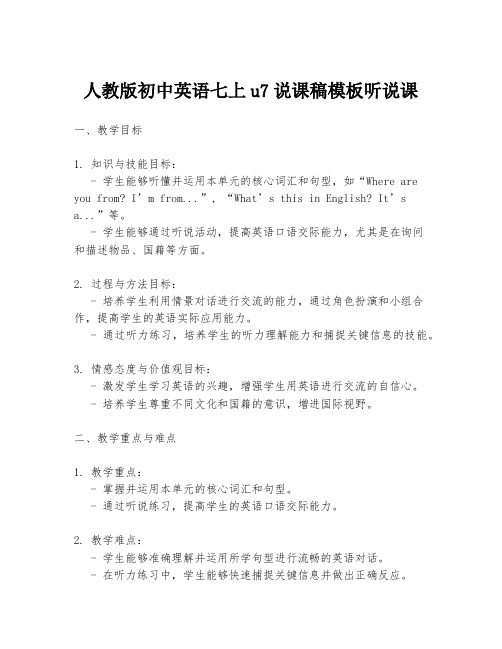
人教版初中英语七上u7说课稿模板听说课一、教学目标1. 知识与技能目标:- 学生能够听懂并运用本单元的核心词汇和句型,如“Where are you from? I’m from...”, “What’s this in English? It’s a...”等。
- 学生能够通过听说活动,提高英语口语交际能力,尤其是在询问和描述物品、国籍等方面。
2. 过程与方法目标:- 培养学生利用情景对话进行交流的能力,通过角色扮演和小组合作,提高学生的英语实际应用能力。
- 通过听力练习,培养学生的听力理解能力和捕捉关键信息的技能。
3. 情感态度与价值观目标:- 激发学生学习英语的兴趣,增强学生用英语进行交流的自信心。
- 培养学生尊重不同文化和国籍的意识,增进国际视野。
二、教学重点与难点1. 教学重点:- 掌握并运用本单元的核心词汇和句型。
- 通过听说练习,提高学生的英语口语交际能力。
2. 教学难点:- 学生能够准确理解并运用所学句型进行流畅的英语对话。
- 在听力练习中,学生能够快速捕捉关键信息并做出正确反应。
三、教学准备1. 教师准备:- 准备与本单元主题相关的图片、实物或多媒体资料,用于激发学生的兴趣和参与度。
- 准备听力材料,包括录音和相关练习题。
2. 学生准备:- 提前预习本单元的词汇和句型。
- 准备参与课堂活动,如角色扮演、小组讨论等。
四、教学过程1. 导入新课- 通过展示不同国家的照片或地图,引入国籍的话题,激发学生的兴趣。
- 教师用英语介绍自己来自哪里,并询问几名学生的国籍,以此复习和引入本单元的核心句型。
2. 听力练习- 播放与本单元主题相关的听力材料,让学生在听的过程中捕捉关键信息。
- 教师根据听力材料提出问题,检查学生的理解情况,并引导学生用英语回答问题。
3. 口语交际- 分组进行角色扮演活动,每组学生模拟在机场或旅游场合询问和介绍国籍、物品等情景。
- 教师巡视课堂,指导学生正确使用句型,并鼓励学生大胆开口说英语。
Unit7SectionA(2a3c)全英版教案 (人教版七年级上册英语)

Unit7SectionA(2a3c)全英版教案 (人教版七年级上册英语)Unit7 SectionA(2a—3c)全英版教案Teaching Aims1. Knowledge Object:(1)Function:Know the procedures of shopping as well as shopping language.(2)Key Vocabulary:color, black, white, red, green, blue, yellow, big, small, short, long(3)Target Language:—Can I help you? —Yes, please. I need a sweater for school.I’ll take it.(4) Structure:How to use “how much” questions.2. Ability Objects:Know how to shop in English speaking country.3. Moral Objects:After learning this lesson, students will be able to know the importance of saving money and respect parents’ hard work.Teaching Key PointsMaster the description words and shopping procedures.Teaching Difficult PointsGet students to know how to shop especially ask about the price and choose what you like.Teaching MethodsPair work; Task-based teaching methodTeaching AidsA tape recorderTeaching ProceduresStep 1 Greetings and Warming up (About 2 minutes)T:Boys and girls. Are you happy today? I’m very happy because I can see you again and know more about you.Step 2 Revision and Drawing (About 8 minutes)T:Yesterday I went to a clothes store and found many beautiful clothes in it.Do you want to know what kind of clothes are there in it? Now everybody, please take out a piece of white paper and colorful pencils. Listen carefully and draw beautiful clothes on the paper as I say. Are you ready?(Ask two students to come to the front and draw clothes on the blackboard.)This is a big clothes store. Its name is Mr. Cool’s Cl othes Store. There are many beautiful clothes in it. First I see a white sweater, I like it very much. It’s only $ 7. Then I see a green T-shirt. It’s $ 5.I also see a red skirt. It’s $ 6. It has blue pants for $ 8 and black shoes for $ 9. I find a beautiful hat, too. It’s yellow and it’s $ 3. The red bag is also very nice. It’s $ 5. The white socks are on sale now—only $ 2. It sells black shorts at a very good price—only $ 4 each. Please come and see for yourself at Mr.Cool’s Clothes Store.(After giving orders, check their pictures and evaluate them.)T:Wonderful pictures! I think you are all good painters. I like them very much.Step 3 Presentation (About 10 minutes)1. Show pictures of two bags. Tell the students: Look at these two bags. This one is red. It’s five dollars. It’s big. And this one is blue. It’s 3 dollars. It’s small. Make sure the students understand the meaning of “small” and “big”.2. Show two pairs of socks. Tell the students: This pair of socks is long. They are five dollars. That pair of socks is short. They are three dollars. ( Help the students to understand “long” and “short”.)3. Let students look at the pictures, compare with the hat, the T-shirts.And let them describe like this:It’s a big red hat. It’s a small yellow hat.4. T:Now, look at your book, turn to page 38, 2a. We’ll do some exercises.Step 4 Listening (About 5 minutes)1. Ask the students to look at the pictures on page 38,2b. Play the recording for the first time for the first time for the students to listen and circle the things they hear.2. Play the recording for the second time, let students listen again, then fill in the price tags.At last, check their answers.Step 5 Pair work (About 6 minutes)1. Let students work in pairs to ask and answer questions about the things in 2b like this:A: I like these shorts. How much are they?B: They’re six dollars.2. Ask one student to read the conversation on page 38, 2e to the class. Then letstudents role-play the conversation with their partners.Step 6 Practice (About 12 minutes)1. T:Look at the words in the three boxes on page 39, 3a. Can you use these words to make sentences? Have a try,please!e. g. :How much is the yellow T-shirt?2. T:There are some clothes,pictures on page 39,3b.Their prices are given, so fill in the blanks with questions and answers.3. T:Close your books, please! Ask and answer questions use the information you have got from 3b.Step 7 Homework (About 2 minutes)Write a short passage about shopping with your parents.Blackboard DesignUnit 7 How much are these socks?The Second Period (Section A 2a — 3c)Can I help you? = What can I do for you?What’s the price of …=How much is/are …—What color do you want?—I’ll take it. = I’ll take them.—Thank you.—You are welcome.。
Unit 7 Section A(1a-Pronunciation)课件人教版2024新教材七上英语
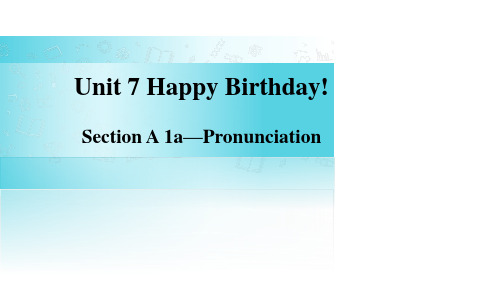
1b Listen to the conversations and match the people with their
birthdays.
match v. 匹配
match...with..与……匹配
B C D A
1c Listen again and answer the questions.
can you help me?你 能帮助我吗?此处 的can表示请求
sweet adj. 甜美的 That’s so sweet! 那太贴心了,较为
口语的表达方式
on 9th January
在一月九日
make a card for sb.
soon adv. 不久
为某人做卡片
Conversation 3 Peter: Meimei, when is Ms Gao's birthday? Meimei: Why do you ask? Peter: Because I want us all to give her a surprise. Meimei: Sounds fun! Her birthday is on 12th June. Peter: Let's sing a song for her. I'll play the guitar. Meimei: Great idea!
Language Points
Conversation 1
3rd December 12月3日,也
Fu Xing: Today is 3rd December. Happy birthday, 可以表达为December 3rd
Helen! Helen: Thank you, Fu Xing!
牛津深圳版七年级上册英语U7 Speaking-最新
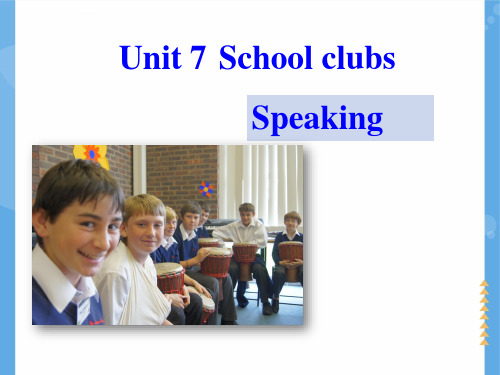
/Id/
asked disppeared attended
w alked ed carried
stopped dialled
Unit 7 Speaking
Part III While-Learning
Talk time
Read the words after the tape.
Unit 7 Speaking
Unit 7 Speaking
二. 根据下面的信息内容,补全对话。
A. how to read poems B. Yes, I did
C. Where D. at 8 o'clock in the morning
E. the Poems Club
F. No, I didn't
Leo: We met at the library.
Unit 7 Speaking
A. how to read poems B. Yes, I did
C. Where
D. at 8 o'clock in the morning
E. the Poems Club
F. No, I didn't
Linda: What did you do at the club?
Leo: We learnt (4) ___A____.
Linda: Did you like the club?
Leo: (5) ___B____. I learnt a lot about poems.
It was great fun reading poems aloud.
Unit 7 Speaking
挑战自己,请快速朗读下面的绕口令。 John, where Molly had had 'had ', had had 'had had'。 'had had' had had the teacher's approval.
九年级人教版英语U7知识点

九年级人教版英语U7知识点Unit 7 of the ninth-grade People's Education Edition English textbook covers a range of essential language points and concepts. In this unit, students learn new vocabulary, grammar structures, and practice their reading and listening skills. Let's explore some of the key knowledge points covered in this unit.1. Vocabulary:Vocabulary is a fundamental aspect of language learning. In Unit 7, students encounter a variety of words and phrases related to the theme of "Great scientists." It is essential to understand and memorize these words to improve overall comprehension and communication skills.For example, words like "electron," "invent," "discover," and "technology" are introduced to help students describe scientific concepts and advancements. Learning these words and their meanings enables students to discuss scientific topics confidently.2. Grammar:Grammar is the backbone of any language. Unit 7 focuses on essential grammar rules and structures that help students effectively communicate in English. The unit includes the following grammar points:a) Present Simple Tense: Students learn to use this tense to talk about facts, routines, and habits. For instance, "Scientists use microscopes to study cells."b) Present Continuous Tense: This grammar structure is introduced to describe actions happening at the moment of speaking or temporarily. For example, "He is working on a new experiment."c) Comparatives and Superlatives: Students learn how to make comparisons using comparative and superlative forms, such as "Albert Einstein is more famous than Isaac Newton."d) Passive Voice: The unit discusses the passive voice, where the focus is on the action rather than the doer. For instance, "The theory was developed by a team of scientists."3. Reading Comprehension:Unit 7 includes various reading passages that expose students to different text types, such as biographies, articles, and interviews. These texts enhance students' reading comprehension skills and provide valuable context for vocabulary and grammar usage.The comprehension exercises at the end of each reading passage help students infer information, identify details, and understand the main ideas. By practicing these exercises, students develop critical thinking skills and improve their ability to extract relevant information from a text.4. Listening Skills:Listening skills are crucial for effective communication. Unit 7 incorporates audio materials with different accents and speech patterns. Students listen to conversations, interviews, and scientific explanations to improve their listening comprehension.Listening exercises challenge students to recognize specific information, understand the main ideas, and infer meaning from context. By practicing these exercises, students enhance their ability to understand spoken English in real-life situations.5. Speaking and Writing:Unit 7 also includes speaking and writing activities that promote communication and language production. Students engage in pair or group discussions, role-plays, and presentations, showcasing their understanding of the vocabulary and grammar structures learned.The writing exercises encourage students to express their opinions, describe scientific concepts, or summarize information from readings. These activities foster creativity, critical thinking, and effective written communication skills.In conclusion, Unit 7 of the ninth-grade People's Education Edition English textbook covers various language skills and knowledge points. By learning and practicing the vocabulary, grammar, reading, listening, speaking, and writing tasks in this unit, students can enhance their overall English language proficiency and develop crucial academic and communication skills.。
牛津深圳版九年级英语上册Unit7ListeningandSpeaking教学设计
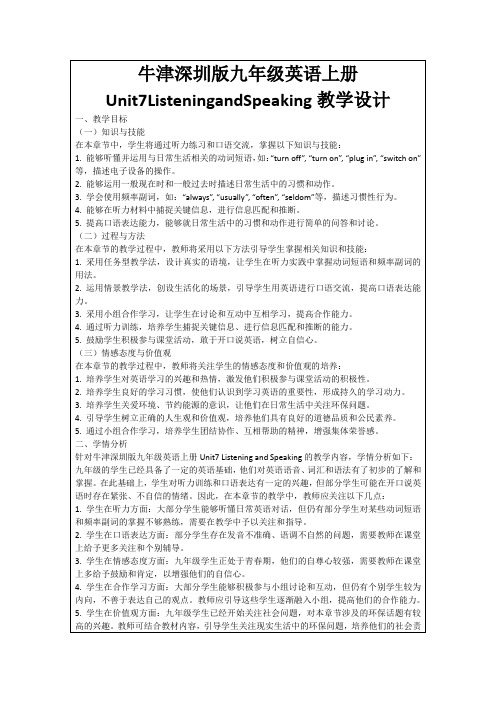
-引导学生关注生活中的环保问题,将情感态度与价值观的培养融入到英语学习中。
5.采用多元化的评价方式,全面评估学生的学习效果。
-结合形成性评价和终结性评价,关注学生在学习过程中的进步和最终成果。
-鼓励学生自评和互评,培养他们的自我反思能力和批判性思维。
作业布置要求:
1.学生需按时完成作业,保持字迹工整,注意语法和拼写正确。
2.家长需协助监督孩子的作业完成情况,鼓励孩子进行口语练习。
3.教师将对作业进行及时批改和反馈,关注学生的学习进步和困难。
2.学生在口语表达方面:部分学生存在发音不准确、语调不自然的问题,需要教师在课堂上给予更多关注和个别辅导。
3.学生在情感态度方面:九年级学生正处于青春期,他们的自尊心较强,需要教师在课堂上多给予鼓励和肯定,以增强他们的自信心。
4.学生在合作学习方面:大部分学生能够积极参与小组讨论和互动,但仍有个别学生较为内向,不善于表达自己的观点。教师应引导这些学生逐渐融入小组,提高他们的合作能力。
3.教学步骤:
-发放练习题,指导学生完成,并进行解答。
-组织口语练习,鼓励学生积极参与,关注学生的表达过程。
-教师对学生的练习成果进行评价,及时给予反馈。
(五)总结归纳
1.教学活动设计:
-对本节课所学的新知识进行回顾和总结。
-请学生分享学习心得,提高他们的自我反思能力。
2.教学目的:
-帮助学生巩固所学知识,形成长期记忆。
-设计各种听力活动,如信息匹配、听写、填空等,培养学生捕捉关键信息的听力技巧。
-通过角色扮演、模拟对话等形式,让学生在实际情境中运用所学词汇,提高口语表达能力。
研究生英语听说教程(提高级)(07第二版) Tests 1-2

Unit I Personal InformationTask 2Listening: You will hear some instructions about your personal information. Listen to the recording and complete the table below with your answers.Number 1Man: What country would you like to visit? Write it in the circle. If you could go anywhere in the world, where would you go? Write the country in the circle.Number 2Woman: Write a friend's name in the triangle.What's the name of one of your friends? Write the name in the triangle.Number 3Man: Where are you from? Write the name of the place in the square.In the square, write the name of your hometown.Number 4Woman: What do you like to do in your free time?Write it in the triangle.What are you interested in? Write a free-time activity in the triangle.Number 5Man: What don't you enjoy doing? Write it in the circle.In the circle, write down something you don't like to do.Number 6Woman: At school, what is or was your favorite subject? Write it in the square.What class at school do you or did you like the most? Write the name of the subject in the square. Number 7Man: Write your favorite kind of music in the triangle.What kind of music do you like the best? Write it in the triangle.Number 8Woman: In the circle, write something you like best. It can be a food, a sport, or anything else.Write the name of something you like best in the circle.HereditaryAggressiveSubtractaddTask 4Listening: Look at the following questionnaire about your life expectancy. First fill in this questionnaire with information about yourself. Then listen to the recording and write down the scores for each question. Add up your total life expectancy.What do your answers to the questionnaire mean?Write what you must add or subtract in the boxes.1. If you're a man subtract 3 years and if you're a woman add 4 years.2. If you're between 30 and 39 years old add 2 years; If you're between 40 and 59 add 3 years; between 50 and 69 add 4 years.3/4. Towns and cities are unhealthy places; If you live in a large town or city take off 2 years, but if you live in a village or in the country, add 2 years.5/6. Married people live longer; Take off three years if you live on your own, but you can add 5 years if you live with a partner.7/8. Education is good for you. Add I year for a university degree and another 2 years for a postgraduatequalification.9. If you sit down most of the day, subtract 3 years.10. Add 2 years if you exercise for at least 20 to 30 minutes 3 times a week.11. If you spend more than 10 hours a day asleep, take off 4 years.12. If you're happy add a year; If you're unhappy subtract 2 years.13. If you're relaxed add 3 years. Subtract 3 years if you're quick-tempered and aggressive.14. Don't smoke if you want a long life. Subtract 3 years for up to 10 cigarettes a day, 4 years for 10 to 20,6 years for up to 40 and 8 years for more than 40. If you're a non-smoker, but you live with a smoker,take off I year.15. Three glasses of wine or beer a day are OK for men, 2 are OK for women. If you drink more than this,take off a year.16. Overweight? If you're up to 15 kilos too heavy subtract 2 years, 16 to 25 kilos take off 4 years.17. Long life runs in families. Add 2 years for each grandparent over 80 years old now or when they died.18. Some diseases are hereditary, too. Take off three years if anyone in your close family (brothers, sisters,parents, grandparents) has or had heart trouble. Take off another year if anyone in your family died under the age of 50.To calculate your life expectancy, start with an average age of 72 years. Then add or subtract the numbers.Task 6Listening: A group of people have just met. They will go on an expedition tour from London to South Africa. They are now introducing themselves to others. Listen to the recording and complete the chart below with what 3ou hear.Marie: Hi, everyone. Welcome to Thrillseekers. I'm Marie Gregg and this is Jack Roberts. We're going to be your guides on our expedition from London to South Africa.Jack: Hi! As you heard, my name's Jack and, as you can probably tell from my accent, I'm from South Africa. And this is Bessie, our trusty vehicle. She's going to take us all the way down through Europe and Africa to Cape Town. Now we're going to be together on the road for the next five weeks, so we need to get to know each other. Can I ask you all to introduce yourselves briefly to the group? Now, who would like to start? Yes?Lulu: Hello, everybody. My name's Lulu McNulty and I'm from Sydney, Australia. I'm a fashion designer.My father was born in South Africa. I've always wanted to go there, because he's told me so much about the place. So I'm really looking forward to the trip.Jack: Thanks, Lulu. And now the person next to Paola.Paola: Hi. I'm Paola, PaolaRossi. I'm an accountant. I work for a big chemical company. Oh, and I'm from Argentina from Buenos Aires. At the moment I'm working in London. I've been here for about a year now. I like travelling but I like a bit of adventure, too. So that's why I wanted to go on this trip.Jack: Thank you, Paola and... ?Istvan: Hi. I'm Istvan Tisza. I'm from Hungary and I'm a student.Marie: What are you studying, Istvan?Istvan: I'm studying psychology at the University of Budapest. I wanted to come on this trip because I'd like to do something unusual. And also I'll have a chance to practise my English.Jack: Thanks a lot, Istvan, and...Task 7Listening: You will hear an interview with someone. Below is a list of questions for the interview.Listen to the recording and not down the answers to the questions in the spaces provided.( I = Interviewer; C = Celebrity)I: Could you tell us a little bit about yourself?C. Sure.I: First of all, where were you born?C: I was born in London, but I've got dual nationality because my mother's from Nicaragua.I: Do you still live in London?C: No, I'm living in Ibiza now.I: Oh, really? How long have you been there?C: Not long. I moved from London with my two daughters, Assisi and Amba, about six months ago.I: Are you happy there?C: Yeah, very happy. We love the outdoor life. Also, my mother's a Spanish speaker and I feel more comfortable in a Latin country.I: Have you made any new friends?C. Yeah, I've made lots of new friends here. A few English, but my two best friends are Argentinian andSpanish.I: What do you do for a living?C: I'm a painter, but I've recently started a jewellery business with a friend, and that takes up most of my time. I also do some modelling when I need the cash!I: And what do you do in your free time?C: Well, with a business and two young children I don't have much free time, but I love reading and listening to music.I: What sort of music do you like?C: All sorts: pop music and classical.I: Do you ever listen to the Rolling Stones?C: No, never, but don't tell my father.I: How often do you see your parents?C: Not very often. My mother's in New York and my father's often on tour. But we all love big family get-togethers.I: You've obviously travelled a lot. What's your favourite placein the world?C: That's a difficult question because I've been to so many amazing places, but I think Brazil is my favourite. The children love it there too.I: Finally, can I ask one last question--who chose your name?C: I think my father chose it. My mother wanted me to have a Spanish name.Unit 2 Daily PlansTask 3Listening: You will hear two people arranging a meeting to talk about a few things. Below are the diary pages for the two of them. Some of the information is missing on the diary pages. Listen tothe recording and fill in the missing information with what you hear.Mary: When can we get together to discuss a few things, Alan?Alan: Just a minute, let me get my diary. Right. This week?Mary: OK. We need about two or three hours. What about today? Are you free this morning?Alan: No, sorry. Some people from Poland are coming to see us. But they're leaving at midday, so theafternoon's free.Mary: No, I can't make that. We're interviewing for a new secretary.Alan: Are you doing anything on Tuesday?Mary: Well, I'm giving a lecture at 10:00 and I'm going to the dentist in the afternoon. How about lunch? Alan: No good, I'm afraid. I'm having lunch with Peter. Is Wednesday afternoon any good for you? I'm going to an exhibition in the morning, but the afternoon's free.Mary: No, I'm sorry, That's no good for me. I'm meeting the director at 2:30.Alan: Well, I'm afraid that's it for this week, then. I'm going to Holland on Thursday morning.Mary: Oh yes, so you are. When are you coming back?Alan: Sunday, but I don' t get back till 11:00 at night. Is any evening any good for you?Mary: No, I'm rehearsing for my new play every evening this week.Alan: Well, it looks like next week, then. But anyway, I must go now. Bye, darling.Mary: Bye. Don't forget you're taking the children to the party tonight.Alan: What? But I'm playing tennis at 7: 00. Can't you take them, Mary?Mary: No, I told you. I'm rehearsing this evening.Alan: Oh, damn. Now I can't...Task 4Listening: You will hear four short conversations. In each of them, some people are making arrangements for an activity. Listen to the recording and complete the table below with what you hear. Number 1(Phone rings; Pickup)Karen: Hello.Tony: Hi, Karen. This is Tony.Karen: Oh, hi. I'm looking forward to lunch tomorrow.Tony: Uh, that's what I'm calling about. We were supposed to meet at noon, right?.Karen: Yeah. Um, at the Bangkok Cafe.Tony: Look, we're kind of busy here at work. Can we have lunch a little closer to my office? I have to get right back to my desk.Karen: Yeah, OK. How about the Plaza?Tony: The Plaza? Great! I love their salad bar.Karen: OK I'll see you at the Plaza at noon then.Tony: OK. Sorry about the change, Karen.Karen: Oh, no problem.Tony: Bye.Karen: Bye. (Hangs up)Number 2First Woman: So we're meeting at seven-thirty in front of Hayes Hall, right?Second Woman: Well, how about earlier? Would you like to get something to eat before the concert? First Woman: That'd be nice. Let's go to the Museum Cafe.Second Woman: OK. About six-thirty?First Woman: Ah, well. Let's meet at six. Give ourselves a little more time. We don't want to be late for the concert.Second Woman: Six, at the Museum Cafe. Got it. No problem.Number 3Announcer: Attention passengers on Northern Airways flight 475 to Seattle. There has been a delay. Theflight will now depart at six o'clock. Flight 475 to Seattle will leave at six o'clock from gatetwelve.Passenger: Six o'clock! Great. We've got some time. Let's get something to eat.Number 4(Phone rings; Pickup)Patient: Hello.Secretary: Hello. Ms. Clark?Patient: Yes.Secretary: This is Dr. Lee's office. You have an appointment today at two-thirty.Patient: Yes, that's right.Secretary: We're very sorry, but Dr. Lee was called to the hospital today. We'd like to reschedule your appointment to tomorrow at the same time.Patient: Tomorrow at two-thirty? That's the twenty-first?Secretary: That's right. Tomorrow at two-thirty.Patient: That's OK.Secretary: We're sorry for the inconvenience.Patient: That's all right. Goodbye.Secretary: Bye.Task 6Listening: Joe Hill is a manager of a company. He has two assistants: Samantha and Colin. He also .has a secretary named Mandy. Joe's life at the moment is getting very busy. In addition to his normal heavy workload, there are a number of other things needing his attention. You will hear a conversation between Joe and Mandy. Listen to the recording and write down Joe's activities for the day.Mandy: Are you ready to go through the diary for today?Joe: Yes, OK.Mandy: Well, first there are several letters on your desk that need signing. Then from 9:30 to 10:30 you've got a meeting with John Clark from KRP. He's already arrived.Joe: Uh-huh.Mandy: At 10:30 there's the regular monthly meeting of the finance committee.Joe: When does that finish?Mandy: At 12:00. Then Sheila Gordon is coming over about the new offices. She wants to discuss the new designs with you.Joe: Does that have to be today?Mandy: Well, it seems so. We're the only department that hasn't chosen the colours and furniture and so on. So we've been holding everything up.Joe: All right.Mandy: That will probably take till 1:00 p.m. And we were supposed to be going over to see the building some time today, too. Then at 1:00 p.m. you'll be having lunch with the Managing Director.Joe: Oh, yes. He wants to discuss next week's meeting. We don't want a repeat of last year, do we, Joe?Oh dear.Mandy: Then we've set aside this afternoon for writing the annual report. The deadline is 5 o'clock, if we're to get it out in time for the Directors' meeting next week.Joe: I hate that job. It always takes at least three hours.Mandy: And you're leaving at 5:00 p.m. promptly today.Joe: Yes, it's my son's birthday party.Mandy: Well, you can't miss that. It's... is something wrong, Joe?Joe: No, I've just been getting some pains in my chest lately, that's all. It's probably nothing.Mandy: You should see a doctor.Joe: When do I get the chance? The surgery is only open till 1:00 p.m.Mandy: Well, you shouldn't take chances with your health. Oh, I'm afraid we need to fit something else in today. Samantha phoned just now. She wants to see you today about getting a new assistant. Joe: But she knows the policy on new posts.Mandy: Well, yes, but she says she's got too much work for one person and...Joe: Yes?Mandy: And if you don't see her today, she'll resign. And I think she means it this time, Joe.Joe: Oh dear! Well, when...Male voice: Sorry to disturb you, but we've just had this urgent fax for Mr Hill.Task 7Listening: You will hear a conversation between Joe and his wife. Listen to the recording and note down what Joe is supposed to do for today and tomorrow for the family.Marcia: Hello 87549.Joe: Hello, Marcia.Marcia: Hello, darling. This is a nice surprise.Joe: Well, actually I've got a problem. I've had this urgent fax from Brussels. They want me to go out there this afternoon.Marcia: But it's Donald's birthday party and you promised you'd be there this year. You remember how upset he was when you missed it last year.Joe: I know, but we may lose an important contract if I don't go.Marcia: Well, what time will you be back?Joe: Tomorrow morning, I imagine.Marcia: What? Oh, this is the limit, Joe. You know I'm going to the BCI Conference tomorrow and you said that you'd take Donald and Sarah to school and pick them up.Joe: Oh no. I'd forgotten about that. Can't you get someone else to take them?Marcia: It doesn't matter, I should have known better than to rely on you in the first place.Joe: Marcia... Marcia! Oh damn.Task 9Listening: You will hear Joe talking with his secretary Mandy again. They are talking about what Joe should or shouldn't do today. Joe will have to make some decisions. Listen to the recordingand complete the chart below with what you hear.Presenter: Joe has one main problem. He has too much to do. It's a common problem that we all have at some time in our lives. How should you deal with this problem? Well, there are three things that you must decide:1. What are my priorities?2. What can I delegate? What can or should be done by someone else?3. Are other people making unreasonable demands? So let's see how Joe deals with the situation in the light of these questions.Joe: Right then, Mandy. I've had a think about today. This is what we're going to do.Mandy: OK. I'll get the diary.Joe: Now. I've got to see John Clark, because he's already here. But the finance meeting and the meetingwith Sheila Gordon... Colin can deal with those. He's learning the ropes and the best way to do that is to take responsibility.Mandy: Right. I'll phone him.Joe: So I'm now free after 10:307Mandy: That's right.Joe: Now my first priority is to stay alive. So I want you to make an appointment at the doctor's about these pains in my chest, please.Mandy: Very sensible.Joe: Then after that, could you ask Samantha to come and see me? We can't lose her so I must see her. Mandy: But what are you going to say to her about the new post?Joe: I'll promise to put her request for a new post to the Directors' meeting next week. I hope that will keep her happy.Mandy. What about the birthday party?Joe: Well, I've promised my wife and children that I will be there this evening, so I'm going to keep that promise and I need to keep the Directors happy. So it's very important that I have lunch with the Managing Director and that I write the annual report. But I think Colin can help me with that. Mandy: So what about the Alitrain contract?Joe: Well, I think Alitrain are being unreasonable. If their new chap wants to speak to me, he shouldn't leave it to the last minute. You can't do business like that. So I think that's it. Could you get me the Belgium office on the phone, please?Mandy: Yes, of course. Oh, what about going over to see the new building?Joe: Oh, that can wait. I'll go and see it tomorrow.Unit 3 PlacesTask 3Listening: You will hear an interview with four people about their opinions of different places. Listen to the recording and note down the information 3ou hear to fill in the chart below.Number One(I = Interviewer; P = Paulo)I: Do you like your city?P: Oh yes, I feel lucky to be living in a city that's so big and exciting. I love looking out of my apartment window over the high-rise buildings.I: What's the city centre like?P: Some people say it's too noisy and crowded, but I love that. There's always something to see and do.We also have the most famous beach in the world--Copacabana Beach. Then, on the other side of the city, there are beautiful mountains. The highest one is called Corcovado, and it has the famous statue of Christ. If you look down at the city from there, the view is spectacular.I: What's the weather like?P: It's great most of the time. The only time I don't like Rio much is in the summer: it's too hot and humid.Number Two(I = Interviewer; G = Gisela)I: Do you like your city?G: Yes, it's wonderful. I think my city has everything.I: What's the architecture like?G: It's a mixture of old and new with plenty of shops for everybody. The castle is the most famous monument, and at night it looks amazing.I: What's the nightlife like?G: It's a young city because of the university, so there are plenty of cheap restaurants and interesting cafes and bars. It s got a great nightlife.I: And what are the people like?G: Well, some people are a bit reserved, but in general they're really friendly.Number Three( I - Interviewer; A - Armelle)I: Where do you live?A: Well, I live in a small village with my parents. My grandparents live here too, and my aunts and uncles. In fact, I think I'm related to about fifty per cent of the people in my village.I: What's your village like?A: It's very pretty. The countryside is beautiful, and the air is lovely and clean. But it's too quiet. I find it so dull and boring here--there aren't any discos or cinemas.I: What are the people like?A: Oh, they're lovely, but there aren't many young people. I want to go and live in the city. Soon. Number Four(I = Interviewer; L = Luigi)I: What do you think of your city?L: It is a very special place. There is nowhere else in the world like my city--it's so romantic.I: What's the city centre like?L: The buildings are beautiful, and we have San Marco, one of the most famous churches in the world.San Marco Square is wonderful, and during carnival in February Venice is the best place in the world to be.I: Do you like living here?L: No, I really hate living here. It's horrible. There are too many tourists everywhere.I: Oh dear. What are the shops like?L: Well, because of the tourists the shops are too expensive and the canals are dirty and polluted. My city is not big enough for all these people. Why don't they leave us in peace?Task 5Listening: What do you already know about Hong Kong? You will hear someone talking about this place. Listen to the recording and note down the information you hear.Talking about Hong KongUm, the population of Hong Kong is, urn, it's about six million. Um and there are a large number of islands, the New Territories and Kowloon are actually part of the mainland of China but Hong Kong Island is actually separate from that, um, the population, there tend to be well, open spaces and then very densely populated areas. As far as the climate's concerned, in the summer, um, it reaches 34 degrees but the humidity can be sometimes up to about 100 per cent so it, it's very very sticky...Um, as far as the food is concerned, it's a wonderful place, I mean, I think there are something like 19 thousand restaurants for a population of six million, which is incredible--it's the most incredible place...Um it's the sort of place where everybody has to be responsible for themselves financially, there's no social security network so people try to make their fortunes and there is an emphasis on money.., but most people are really friendly. I think anyway.Umm. Then, as far as the food's concerned, it's very, very mixed, it's the kind of place where you can find Japanese, Chinese, Thai, French, and Italian restaurants all in the same street--and everyone's eating in the Burger King round the corner !Task 6Listening: You will hear three people talking about three different places. Listen to the recording and complete the chart below with what you hear.First, AmeliaAmelia: Everyone falls in love with Rio de Janeiro. People in Rio spend so much time outdoors. Oh, and they are so friendly. Sometimes, it seems that everyone is on one of those beautiful beaches, especially Copacabana. Many, many visitors come just for the music. Samba remains popular, and you won't be disappointed by Rio's excellent nightlife.Next, RolandRoland: Um... I think if you come to Sydney, you'll really enjoy it. The people you meet will always help you, and we re very friendly to strangers. Oh, and of course, Sydney Harbor is absolutely beautiful--it's the largest in the world. And if you really want to see some local animals, uh, you should come to Taronga Zoo--there are all kinds of Australian marsupials there, including koala bears.Finally, LilyLily: Visitors love Singapore for the shopping. It's excellent, and you can get some real bargains here. But... um... what I think you'd like the most about Singapore is the mix of different people--um... Chinese, Malay, Indian, and Europeans. The food is great, too--you know, all kinds of Asian food and not expensive at all. The... um... outdoor food markets are the best places to eat.Task 8Listening: You will hear two people being interviewed about their experience of living in Britain and Ecuador ( ). The first person is from France and the second from Britain. Listen to theinterview and write down their answers to the questions below.Interviewer: What's the best thing about living in Britain?Therese: The best thing? I would say.., my relationship with my boyfriend.I: What's the worst thing?T: Being in Britain! No, I don't know, I think the worst thing is the food.., and the coffee, oh yes, the coffee.I: What do you miss most about France?T: Well, first of all my family, second my food, and third my friends.., my friends most of all.I: What's the strangest thing about living in Britain?T: The strangest thing... I found it very strange, I still find it very strange that the pubs close at 11 o'clock.., and the fact that you can't go into a bar just to... you can't really go into a bar just to have a cup of tea or coffee or you know, at 7 o'clock at night, I find it a little bit strange.I: What advice would you give someone coming to live in Britain?T: A French person? If... What would it be? Bring an umbrella.Interviewer: What was the best thing about living in Ecuador?Jim: The best thing for me I think was the mountains, I loved the mountains.I: And what was the worst thing?J: I don't think there was a worst thing really, I just liked everything about it.I: What did you miss most about England?J: What did I miss most? My bed and er... probably family and friends because I couldn't afford to come home for Christmas.I: What was the strangest thing about living in Ecuador?J: The strangest thing? Being rich! I mean even on my salary I could afford to do things, like, like.., fly somewhere for the weekend.I: What advice would you give someone going to live in Ecuador?J: Travel around as much as they can, it's an amazing place...Unit 4 DietTask 3Listening: You will hear three conversations. Some people are talking about the food and drink they are having at different places. Listen to the recording and complete the table below with what you hear. Number OneMan 1: Ooh, this is really spicy, isn't it?Woman: Whew, yes, it is. It's tasty, though. I don't usually eat curry and rice, but this is really good. Man 1: Curry's not too hot for you?Woman: Oh, no, it's fine. And you know what? The rice tastes really fresh. It's pretty good for a place like this, don't you think?Man 1: Yeah. Gould you pass the water, please? I think I need some more.Woman: Sure, here, I'll pour.Man 2: Hi, is it OK if I sit here?Woman: Oh, yeah, sure. Um, just let me just move my bag off the chair for you.Man 2: OK, thanks.Number TwoMan: ... better than it usually is.Waitress: OK, here you go.Man: Oh, thanks.Woman: Thanks.Man: Thanks a lot.Waitress: Sure. Enjoy!Man: Oh, thank you. You know something, this cheesecake looks really good.Woman: It sure does. Hey now, don't forget we're sharing it!Man: Ha-ha ! I know.Woman: Mmm. Wow, that is rich. Ooh, it's really sweet, too.Man: Do you think that we should get some more coffee?Woman: Oh, no thanks, I think I'm OK. Listen, is it OK with you if we ask for the check now? I know that we're still eating, but I'm in a bit of a hurry.Man: No, sure, it's fine. Thanks. Excuse me, can.., uh... we have the check, please?。
21.ESL Podcast 612 – Introducing a Speaker

ESL Podcast 612 – Introducing a SpeakerLadies and Gentlemen, may I have your attention, please?女士们先生们,请保持安静。
It is my great honor to introduce our guest speaker today.今天非常荣幸请到了我们的演讲嘉宾。
Our speaker is actually a person who needs no introduction, since she is well known in our field as one of its great innovators.Edwina Litton has been called a revolutionary thinker by those in our field.That’s because she has strived to bring attention to those issues that we believe are so important.Dr. Litton holds four advanced degrees and has an honorary doctorate from Harward University.Litton博士获得四个更高的学位和哈佛大学的荣誉博士学位。
In her much-anticipated speech today, she will address what she sees as the future of our field.Without further ado, please join me in welcoming Dr. Edwina Litton.(备注:请志坚行苦学习组的各位学友自己结合PDF文件标出重点词语学习,并尽快把自己的中文翻译稿最晚周五前上交作业邮箱2414515689@)。
九年级英语人教第七单元听力语音播报
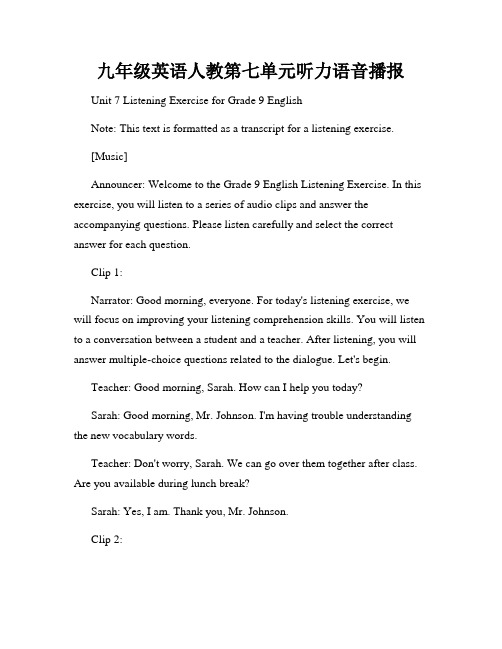
九年级英语人教第七单元听力语音播报Unit 7 Listening Exercise for Grade 9 EnglishNote: This text is formatted as a transcript for a listening exercise.[Music]Announcer: Welcome to the Grade 9 English Listening Exercise. In this exercise, you will listen to a series of audio clips and answer the accompanying questions. Please listen carefully and select the correct answer for each question.Clip 1:Narrator: Good morning, everyone. For today's listening exercise, we will focus on improving your listening comprehension skills. You will listen to a conversation between a student and a teacher. After listening, you will answer multiple-choice questions related to the dialogue. Let's begin.Teacher: Good morning, Sarah. How can I help you today?Sarah: Good morning, Mr. Johnson. I'm having trouble understanding the new vocabulary words.Teacher: Don't worry, Sarah. We can go over them together after class. Are you available during lunch break?Sarah: Yes, I am. Thank you, Mr. Johnson.Clip 2:Narrator: Now, let's move on to the next audio clip. This clip is a short monologue by a native English speaker. After listening, you will answer questions based on the information you hear. Let's listen.Speaker: Hi, my name is Jane and I work as a tour guide in London. Today, I would like to introduce you to one of the city's iconic landmarks –the Tower of London. The Tower was originally built as a royal palace, but it also served as a prison throughout history. Nowadays, it's a popular tourist attraction, where you can learn about the British monarchy and see the Crown Jewels. Don't miss the opportunity to visit this historic site when you come to London!Clip 3:Narrator: It's time for the final audio clip. This clip is a conversation between two friends. After listening, you will answer questions to test your ability to understand spoken English in a conversational context. Let's listen.Friend 1: So, how was your weekend, Mark?Mark: It was great! I went hiking with my family in the mountains.Friend 1: That sounds like fun! Did you see any wildlife?Mark: Yeah, we saw a fox and a couple of deer. It was amazing.Friend 1: I'm so jealous. I wish I could go hiking too, but I had to study for our math test.Mark: Don't worry, we can go hiking together next weekend. It'll be fun![Music]Announcer: That concludes our Grade 9 English Listening Exercise. Please check your answers and review any questions you found challenging. Thank you for participating, and we hope you found this exercise helpful in improving your listening skills. Have a great day!Note: The above transcript is an example of a listening exercise and does not contain the actual audio clips. The exercise may contain additional instructions and questions that are not included in this transcript.。
英语作文介绍人模板
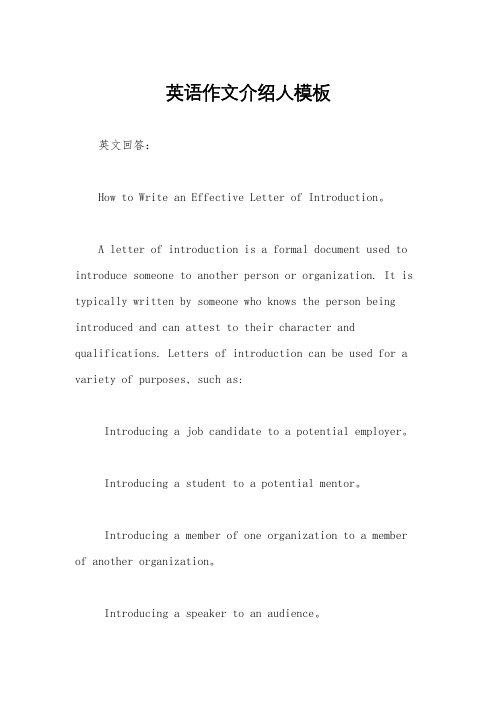
英语作文介绍人模板英文回答:How to Write an Effective Letter of Introduction。
A letter of introduction is a formal document used to introduce someone to another person or organization. It is typically written by someone who knows the person being introduced and can attest to their character and qualifications. Letters of introduction can be used for a variety of purposes, such as:Introducing a job candidate to a potential employer。
Introducing a student to a potential mentor。
Introducing a member of one organization to a member of another organization。
Introducing a speaker to an audience。
When writing a letter of introduction, it is important to be clear, concise, and professional. The letter should include the following information:Your name and contact information。
The name of the person you are introducing。
The reason for the introduction。
人教版英语九年级全册Unit7 SectionA(1a-2d)名师教案

过程
措施〔教师活动与学生活动〕
目的
持续性评价
DELC4
1预备与激活先期知识Step 1Greeting and Leading in ( 3mins )
1.Greet the class.
2.T: There are many rules in our school or at our home .Can you share some with us? Can you watch TV on school nights?
S2:No. I don’t think students should be allowed to watch TV on school nights. Because we have to study?
T: Do you agree teenagers shouldn’t be allowed to get their ears pierced?(教授should’ t be allowed to)
DELC5
2
获取新知识
Step2
Pre-
lisetning
〔听前3mins)
Step 3
While-
Listening
〔听中〕
(5mins)
1:P49 1a
1)Read these sentences and understand their meanings.
2)Circle A or D.
3)Share answers in group
结合听力内容,进展目标句型学习与操练。
学生能否用目标词汇和句型讨论
Step 6
While-
listening
〔听中〕(13 mins
Expressions-at-a-Conference-会议常用英文表达

5
Thanking a speaker
• Now, thank you Prof…. for a most informative talk. • Mr. Barton has given us much to think about and we
会议用语 (Expressions at a conference)
1
Ways of addressing people
• Ladies and gentlemen • Dear friends • Dear colleagues • Distinguished guests • (Dear comrades) • Mr. Chairman, fellow delegates, ladies and
gentlemen • Honorable delegates and members of this
Associaiton/ Orgnaizaiton/Union...
2
Ways of declaring the inauguration
• I declare the meeting open. • According to the order of our program today, I will
preside at (over) this session. I would like to have your kind cooperation. • The program for this session will cover… • Dear friends, may have your attention, please? • I would like all of you to feel at home here in China. • I wish to extend a warm welcome to you who have come from all parts of the world to attend this meeting (conference, symposium, seminar…)
人教版七年级英语上册Unit7SectionA(2b、2c)片段听力优秀教学案例
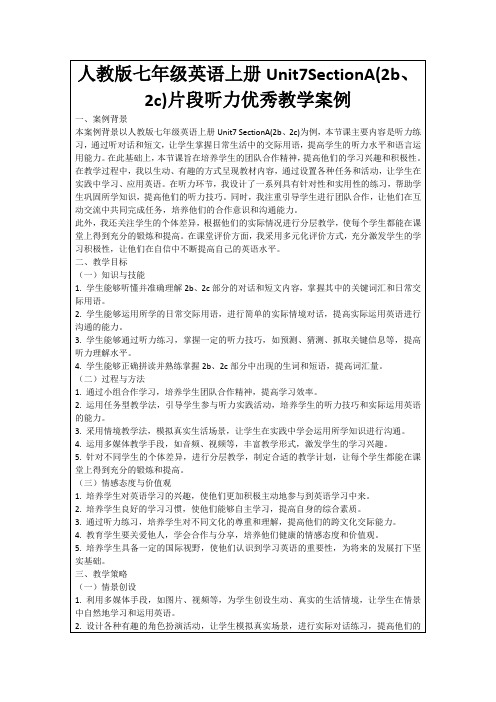
5.针对不同学生的个体差异,进行分层教学,制定合适的教学计划,让每个学生都能在课堂上得到充分的锻炼和提高。
(三)情感态度与价值观
1.培养学生对英语学的学习习惯,使他们能够自主学习,提高自身的综合素质。
人教版七年级英语上册Unit7SectionA(2b、2c)片段听力优秀教学案例
一、案例背景
本案例背景以人教版七年级英语上册Unit7 SectionA(2b、2c)为例,本节课主要内容是听力练习,通过听对话和短文,让学生掌握日常生活中的交际用语,提高学生的听力水平和语言运用能力。在此基础上,本节课旨在培养学生的团队合作精神,提高他们的学习兴趣和积极性。
4.学生能够正确拼读并熟练掌握2b、2c部分中出现的生词和短语,提高词汇量。
(二)过程与方法
1.通过小组合作学习,培养学生团队合作精神,提高学习效率。
2.运用任务型教学法,引导学生参与听力实践活动,培养学生的听力技巧和实际运用英语的能力。
3.采用情境教学法,模拟真实生活场景,让学生在实践中学会运用所学知识进行沟通。
2.设计各种合作任务和活动,让学生在互动交流中共同完成任务,提高他们的团队合作能力和沟通能力。
3.教师在小组合作过程中要加强指导,关注每个学生的个体差异,确保他们能够在团队中得到充分的锻炼和提高。
4.采用小组评价机制,鼓励学生互相评价、互相学习,提高他们的自我认知和评价能力。
(四)反思与评价
1.教师在课后要及时反思自己的教学效果,发现存在的问题,为下一节课的教学做好准备。
3.小组合作促进互动交流:教师合理划分学习小组,设计各种合作任务和活动,让学生在互动交流中共同完成任务,提高他们的团队合作能力和沟通能力。这种小组合作的学习方式不仅使学生更好地理解教材内容,还培养了他们的团队合作精神。
Introducing-a-Speaker
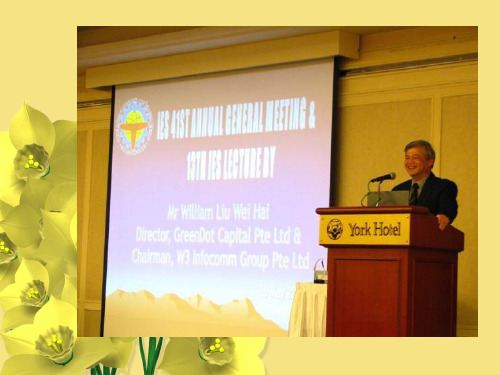
Anderson.
Sample 2: Good evening, everybody. I am pleased to introduce today’s guest speaker, Prof. Huston. Professor Huston is too well-known to require my introduction. I think we’re all anxious to hear his remarks, so let us welcome him to the podium.
(If there are more speakers…) -Introducing the next speaker … - Adjourning or closing the meeting
Introducing the Keynote Speaker
2) What will be introduced to the participants about the keynote speaker?
a. The speaker’s name, title and position b. Background information --the speaker’s educational background --the speaker’s past and present experience (social activities) --the speaker’s achievement (works and articles) --the speaker’s speaking experience --the awards and honor of the speaker c. The presentation topic of a speaker
- 1、下载文档前请自行甄别文档内容的完整性,平台不提供额外的编辑、内容补充、找答案等附加服务。
- 2、"仅部分预览"的文档,不可在线预览部分如存在完整性等问题,可反馈申请退款(可完整预览的文档不适用该条件!)。
- 3、如文档侵犯您的权益,请联系客服反馈,我们会尽快为您处理(人工客服工作时间:9:00-18:30)。
Opening
• The OPENING is when you address the audience - they are the listeners so you need to grab their attention. • Wait until the audience is quiet and expectant before you begin to speak. An introduction no-one hears is very hard on the speaker - and could jeopardise the opening of his/her speech.
(continued)
• Write out your introduction. Practice it in front of a mirror or into a tape recorder for timing. Practise it to sound natural and enthusiastic. Reduce your written introduction to a few key words and phrases. Transfer them, in large font, to a large sheet a paper. This will be your crutch and because it is there you will probably not need to look at it.
Background information
• Even an experienced and accomplished speaker can be nervous when speaking before a group and an introduction can either set the scene for a successful presentation or leave the speaker flat-footed and struggling to regain the attention of their audience and the convey their message.
How to craft a good introduction?
• The answer is prepare, practice and be enthusiastic. These need not take long once you understand what you are doing and why. Preparation involves learning about the speaker, the topical nature of the subject and the audience's interests and concerns. Get speaker information from the speaker. Get audience background from members of the audience and subject information from the Program Chair, the related current awareness media or your own pipeline.
(continued)
• When you ask for information, ask what the speaker would like you to emphasize or what the speaker thinks is relevant. Some seasoned speakers prefer to write out their own introduction. If a speaker provides a lengthy vitae, do not feel obligated to use it all. Shift through and pick out the things that connect the speaker with the subject and audience.
What you should do as an ucer?
• Before the meeting: reminders and introductions; speaker information; • During the meeting: introducing speakers; shaking hands; clapping; time; guests
(continued)
• A secondary purpose is to motivate the audience to listen. Just because the audience is there it doesn’t mean they are ready to listen. Maybe they came to be seen, take a brief nap or escape something else. You can motivate by giving a preview of the speech from the perspective of the audience. Let them know “What’s In It for Me”-narrow the gap between the audience and the lectern(演讲台).
Conclusion
• Finally the CONCLUSION is where you welcome the speaker, lead the applause and take your seat.
How is a good introduction organized?
• Introductions fuse three elements: the subject, the audience and the speaker. The order of the elements is not important, either can come first or last. The important thing to remember is that the focus is not solely on the speaker, it is on bringing together the three elements so they open a window.
Body (1)
• The BODY of your introduction should tell the audience who the speaker is and prepare them by giving some background on the speaker's experience, qualifications or special interest in the topic. • Learning something about the speaker helps the audience warm towards him/her - in turn the speaker senses the empathy and begins the speech with more confidence.
The purpose of an introduction
• The purpose of an introduction is to gain the audience's attention. Members of the audience arrive individually and need to coalesce as a group. The audience may have just come from listening to another speaker on a totally different topic and are still mulling over the ideas. They may be in the middle of an interesting conversation with a friend. They may be thinking about modifying their own speech scheduled for later in the day.
(continued)
• It's a mini-speech - usually about a minute long - but it contains all the elements of a full speech - an opening, a body and a conclusion.
Reminders and introductions
• Contact each participant ahead of time to remind them of their assignments and to gather introductory material. Your ability to give a professional introduction of participants will impress your speakers and your audience.
Body (2)
• Weave the speaker's name into the introduction so the audience will clearly relate the speaker to the topic. • Make sure you give accurate information to the audience - the only way to do this is to contact the speaker beforehand, by phone, fax or email. It can be embarrassing for a speaker to have to correct inaccurate facts before starting a speech.
